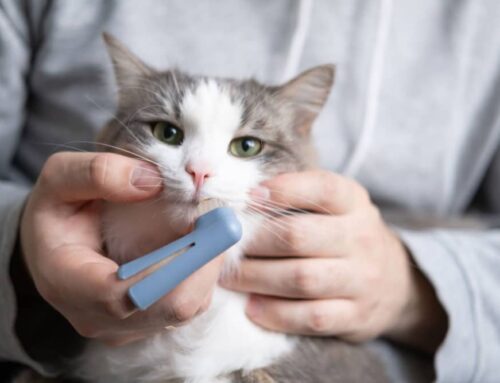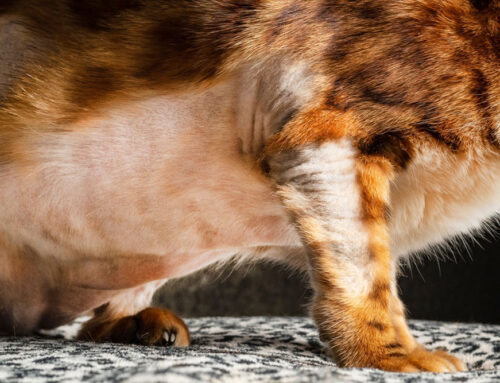When caring for your cat, you likely focus on their daily routine, including nutrition, playtime, and hydration. These are essential facets of encouraging health and well-being in your whiskered friend. However, our curious kitties can also be at risk of accidents, injuries, and illnesses without owner awareness and careful planning. Our Just Cats Clinic team treats many emergencies. To help you protect your furry friend from the most common situations, we provide the following tips.
Annual wellness care for cats
While going to the vet may be the bane of your cat’s existence, these wellness visits protect them from contagious diseases, parasitic illnesses, and other health threats. Annual or biannual wellness exams can detect problems in your furry friend that often go unseen without laboratory testing, or until the illness has advanced. By catching problems early, your cat will have a better prognosis. Preventive care encompasses all aspects of your cat’s health and behavior, and such a holistic approach invariably prevents illnesses that may become an emergency.
Cat-proof your home
Cats can be injured or involved in an accident at home, where toxic substances, sharp objects, and the outdoors pose risks. To cat-proof your home, take the following steps:
- Remove all toxic plants, including lilies, which are highly poisonous to cats, and replace them with non-toxic varieties.
- Pick up loose objects, such as hair ties, rubber bands, nerf gun darts, strings, coins, and buttons, that your cat could ingest.
- Avoid feeding your cat table scraps.
- Store chemicals and household cleaners in sturdy cabinets.
- Close all windows and balconies to prevent escape or accidental fall.
- Monitor your cat while outdoors, using a harness and leash for their safety.
- Keep medications in a medicine cabinet or on a high shelf out of reach.
- Secure electrical cords with a rubber cord cover.
- Secure heavy bookshelves and other heavy objects that could topple over.
Monitor your cat during hot weather
Hot weather can cause dehydration, sunburn, and heatstroke in your cat. Provide them with several bowls of fresh, clean water, that you refill frequently. Cat water fountains are an excellent investment, because the moving water encourages most cats to drink more. You can also place some ice cubes or tuna water in the bowl to entice them to drink and stay hydrated.
Your cat will also need shade and access to cool areas, preferably indoors. Use fans and air conditioning inside or on outdoor patios. Cats can quickly overheat during extreme weather, so ensure your whiskered buddy always has water and shade to keep them cool and prevent heat-related illnesses.
Keep your cat indoors
Roaming or outdoor-only cats are at much higher injury risk and significantly shortened lifespans, often because of vehicle accidents, poisonings, or run-ins with other animals. Therefore, if at all possible, keep them indoors to keep them safe. An indoor cat can be mentally enriched with climbing trees, scratching posts, interactive toys, and perching spots. Additionally, ensure your cat wears a collar with an identification tag, and consider microchipping if you haven’t already done so. Indoor cats can escape, and a microchip is their best chance for a reunion.
Know the signs of a cat emergency
Every second counts when dealing with a pet emergency. Emergency preparedness relies on understanding the signs of pain, injury, or disease in cats. Be aware of the following signs and contact our Just Cats Clinic team for instructions and urgent veterinary care:
- Difficulty breathing
- Trauma (e.g., falling from a height, hit by a car)
- Excessive bleeding
- Bleeding from the mouth, nose, or rectum
- Obvious pain
- Increased vocalization
- Eye injury
- Straining to urinate or defecate
- Persistent vomiting or diarrhea
- Bloated or swollen abdomen
- Unexplained lethargy
- Seizures
- Incoordination
- Collapse
Knowing how to respond in a cat emergency

Rapid response is vital in any urgent health situation to ensure your cat has the best possible outcome. Be prepared by keeping your cat’s carrier, medical records, and medications in one place. Store the contact number for Just Cats Clinic on your phone or behind a magnet on the fridge. Know the location of the nearest veterinary after-hours emergency clinics in your neighborhood or on your travels. Also, keep a pet first aid kit handy to treat cuts, scrapes, or other minor injuries.
While emergencies are naturally unpredictable, you can prevent many cat emergencies through awareness, pet-proofing, and rapid treatment. If you suspect your cat is unwell or injured, contact our Just Cats Clinic team for prompt treatment.













